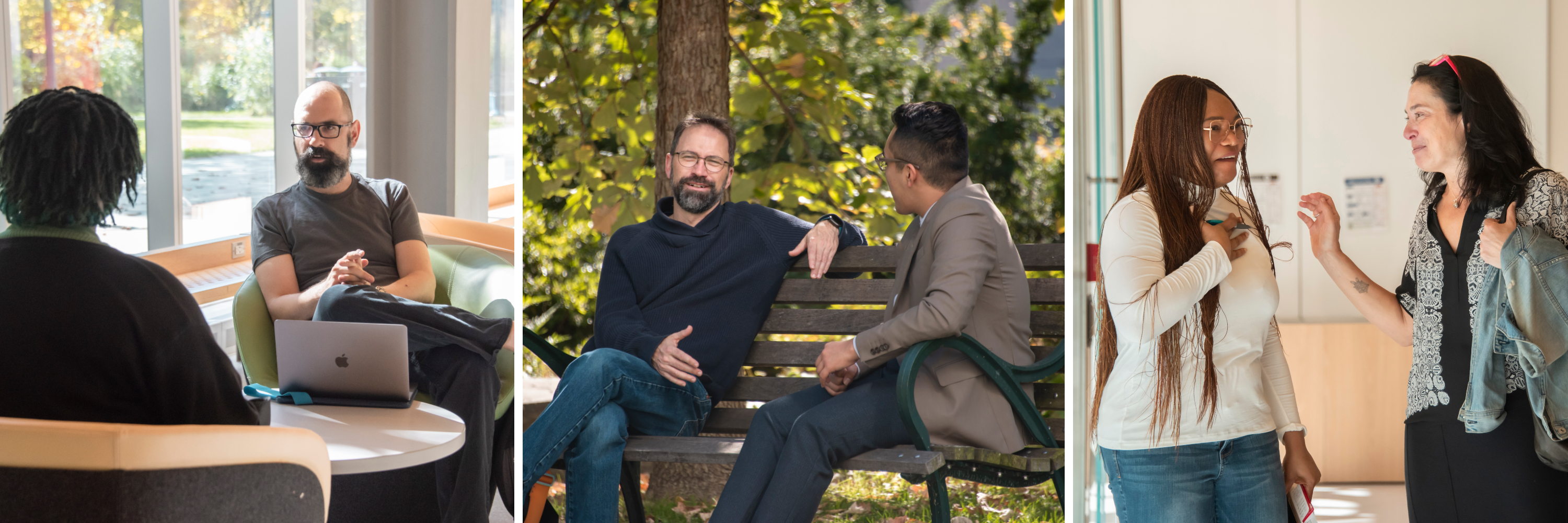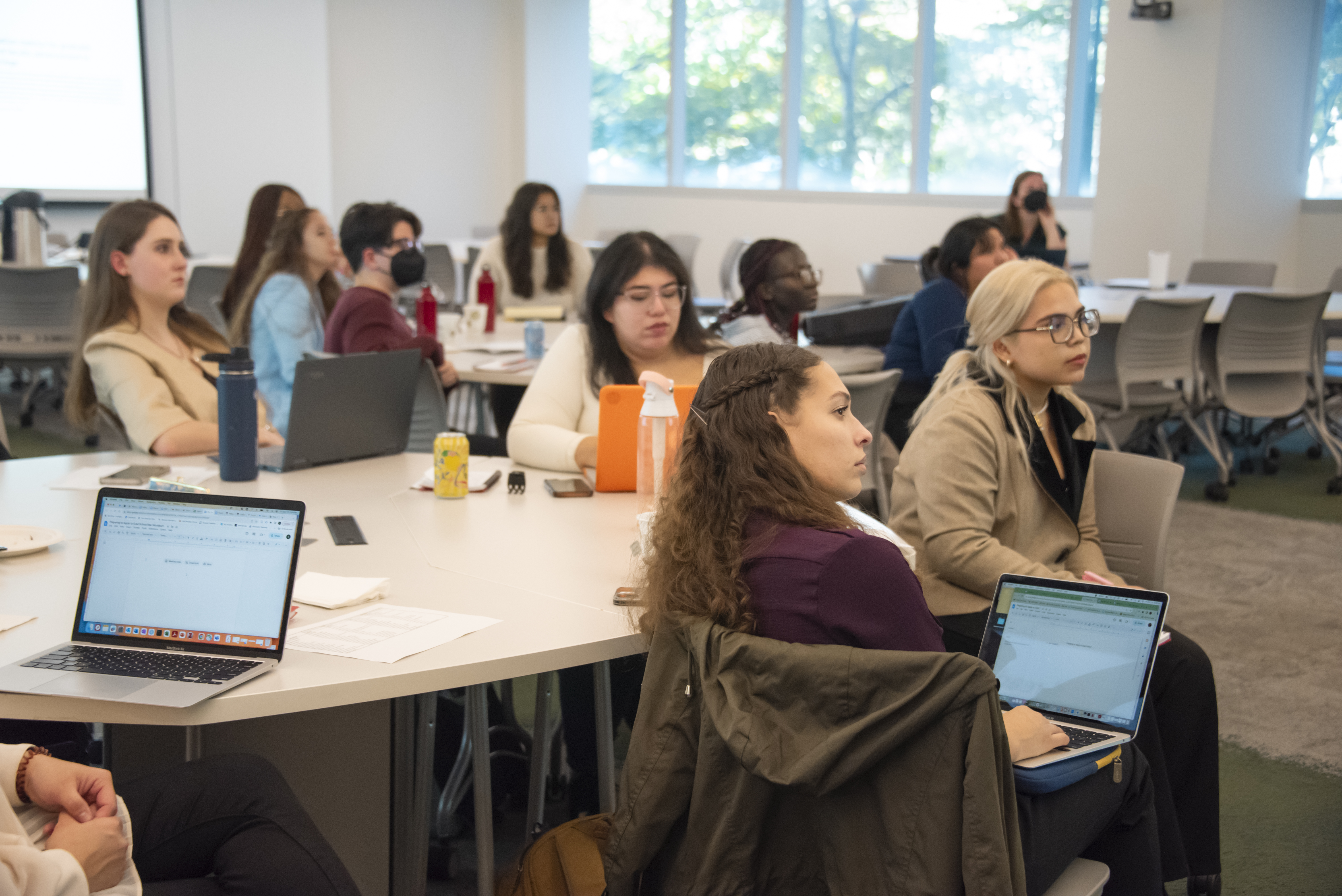In a conference room on the first floor of the Levin Building, Professors Joseph Kable, Rebecca Waller, and Sarah Solomon sat around a corner table, ready to share insight into what they look for in prospective graduate students. Three round tables nearby were filled with 19 eager listeners, Valencia Lagbo and Martha Laramore-Josey among them.
“I’m currently a junior at Barnard College and I’m studying psychology,” says Laramore-Josey. “I thought this weekend would be a good way to have the grad school process broken down. Right now, it’s this ominous, overwhelming entity.”
Lagbo earned her undergraduate degree in 2022 from the University of Virginia, and she currently works for the American Psychological Association. “I’m looking for advice and assistance on taking that next step,” she says. “I thought this program would be a great opportunity for me to learn a little bit more about the intricacies of graduate school.”
The program they’re describing is called DivE In, which stands for Diversity and Equity Initiative. It’s run by MindCORE, a Penn Arts & Sciences hub that brings together faculty from across the University who study human behavior and intelligence. This is the third annual DivE In, started in 2020 by two Penn postdoctoral fellows who wanted to encourage people with diverse backgrounds to pursue graduate-level advanced degrees in fields like neuroscience, psychology, and linguistics.
“It is primarily a mentoring initiative,” says Rista Plate, one of the program’s co-founders, who recently started as a senior researcher at the nonprofit CASEL. “Our focus for DivE In is not only helping students showcase their experiences for grad programs but listening to what their goals and ambitions are, and seeing how we can support them.”
Learning from Faculty
One advantage of the three-day program is connecting with Penn Arts & Sciences faculty like Kable, MindCORE director and Jean-Marie Kneeley President’s Distinguished Professor of Psychology, and Waller, an assistant professor in the Department of Psychology. They participated in the kick-off panel alongside Solomon, currently a Penn postdoc who will begin a faculty position at Binghamton University in the fall.
That conversation, an overview of the application process, quickly got into the nitty gritty of when the panelists like interested potential grad students to reach out, how to do it—and whether it’s even necessary. “People feel like they need to do something,” Kable says, “but when I review applications, I’m going to look at everyone who applied.”
I hope the participants of this weekend walk away feeling like they have this new pillar of support, that they really have someone in their corner.
Waller adds that she likely won’t give more weight to someone simply because she received an introductory email. That being said, “I don’t think it can hurt if it’s brief, to the point, and you think you’re a good fit for my lab,” she says.
The trio also talked about how to tell when you’re prepared to apply for and enter grad school (mental readiness, realistic expectations), plus skills they want to see in an applicant (passion, curiosity, the ability to think like a scientist). “I’m looking for someone who is as obsessed with the thing I study as I am,” Waller says. “I’m looking for that spark.”
Beyond the ‘Default’ Information
The application overview was just the start of a weekend full of learning. DivE In Participants met with mentors and received individualized feedback during a writing workshop. They heard from current graduate students and about funding possibilities. A highlight for many—prospective students and faculty alike—were the mock interviews.
Participants were paired with two researchers, meeting with each for a 30-minute block. “They could use the sessions as true mock interviews or to ask the faculty what they look for in grad applications, how to develop a research interest, really however they wanted to use the time,” Plate says. Delphine Dahan, an associate professor in the Department of Psychology, has done this component of DivE In for the past three years. “I don’t think I’ve ever done a true mock interview,” she says. “Usually, they want to know what it’s like to be a grad student or to hear about my research.”
Dahan says she appreciates the chance to provide would-be graduate students with something she didn’t have before she entered the world of academia: “When I was an undergraduate student, I didn’t know anyone who had a Ph.D. I didn’t know what a Ph.D. program was,” she explains. “I didn’t know I could pursue my education but in a completely different framework—and could get paid, too. That made me realize that the paths people take come out of connections and information that you’re not provided by default.”
Through one of Lagbo’s mock interviews, with Nicholas Balderston, a research assistant professor of psychiatry in Penn’s Perelman School of Medicine, Lagbo heard something she’d never before considered about graduate school. “Professor Balderston told me that not only was I being interviewed by these programs, but that I was also interviewing them,” she recalls. “It’s five or six years of your life so you need to be asking questions so you can understand how you might feel comfortable and supported during your time there. I really liked that he brought that up.”
Making Connections
In between the programmed sessions, DivE In participants had plenty of time for informal connection-building, in particular with their peers and the mentors with whom they were paired, graduate students or postdocs at Penn.
“The intention is that the mentor-mentee relationship continues beyond the weekend. This should be a person to ask those seemingly small questions like what to say in an email or what to wear to a conference. But it’s also a person willing to review grad school application materials,” Plate says. “I hope the participants of this weekend walk away feeling like they have this new pillar of support, that they really have someone in their corner.”
Kable has noticed that DivE In gives participants a chance to see others like themselves, perhaps from racial or ethnic backgrounds less widely represented in fields like neuroscience and psychology. “The feedback we’ve gotten is that it takes what can be an isolating experience and puts you in a room with a bunch of other people coming to it with the same questions, hopes, and fears,” he says.
The camaraderie is evident in the in-between moments, when participants can relax and no longer need to put their best foot forward with professors they’ve only just met, when they think no one is listening. They trade stories and advice. They laugh together about how little they knew about graduate school, and how much they’ll come away with from this experience. Though not everyone there will end up applying to grad school, those who do will have just a little more clarity on what the process entails and support getting through it.
Photos by Chenyao Liu, C’27




